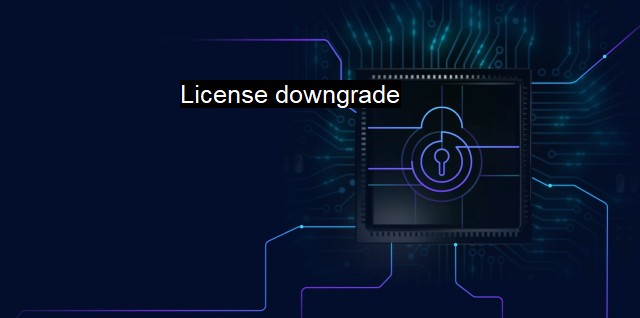What is License downgrade?
Understanding The Process Of License Downgrade In Cybersecurity: Importance, Benefits, And Implications
"License downgrade" is a concept typically observed in the neighborhood of licensed software concerning cybersecurity and antivirus. It is necessary to understand this phrase within the broad landscape of licensing agreements, especially when it comes to antivirus and cybersecurity software.License agreements govern the use of software and are characterized by terms and conditions the user must agree to to utilize the software. A key feature of licensing agreements is that software developers do not sell the software to the end-user but only grant a license for its usage. This handling provides the software developers the flexibility to control the manner and extent of software usage. The concept of "license downgrade" arises from this unique handling of software entitlement.
License downgrade, in the cybersecurity and antivirus realm, is the process where users can (legally) revert to using an older version of the software than what they are currently licensed for. The reasons for downgrading a license can be numerous, but it typically occurs when a user is not satisfied with the upgraded or new version of the software. There may be compatibility issues with existing systems, unintended glitches, or troublesome user interface changes. Hence, users may opt for downgrading their license to continue their operation with the previous, more comfortable version.
It is essential to note that the license downgrade does not necessarily mean full proof security. While the process may enable the users to revert to a 'known good' software state, it may not protect them from closing possible open doors to new, unaddressed vulnerabilities. Since the cybersecurity environment is rapidly evolving, new virus definitions and cyber threats arise constantly. Older versions of software may not be equipped to handle these new challenges, putting the users at a heightened risk unless other preventive measures are taken.
Likewise, license downgrades often don't translate to cost-savings for the user either. Typically, the license pricing corresponds to the level of usage, such as the number of users or servers, rather than the version of the antivirus software itself. Thus, a license downgrade doesn't always offer financial benefit, unless linked with reduced usage.
From a cybersecurity or antivirus company's perspective, license downgrade rights are a strategic offer. Ensuring this flexibility for customers can help build better trust and allow them to test new versions without the fear of being locked in, thereby improving their user experience. Although software developers consistently aim to make each version better than its predecessor, they understand that not all users may share this sentiment, necessitating an option to revert to an older version.
License downgrade rights typically have some limit. They won't authorize users to downgrade to any version ever published but typically only a few versions back from the most recent one. This policy prevents users from abandoning advancements entirely and ensure to some degrees, their safety from cyber threats, keeping both the company interests as part of their redemption plan.
a "license downgrade," within the context of cybersecurity and antivirus software, is a right provided for users to revert to an older version if the advanced version does not meet their expectation or operational requirements. This process is a balancing act for end-users, prioritizing comforts of a familiar system over potential newer threats not covered by older software. For cybersecurity and antivirus companies, providing downgrade rights could be beneficial in fostering customer trust and satisfaction. it is always pertinent to stay as updated as possible to fortify the effectiveness of cybersecurity measures in this continuously evolving digital era.

License downgrade FAQs
What is license downgrade in the context of cybersecurity and antivirus software?
License downgrade refers to the process of activating a lower tier of license for an antivirus or cybersecurity software. This is typically done when a user no longer requires the features and capabilities provided by their current license, or when they wish to reduce costs.Can I downgrade my license for my antivirus software?
It depends on the specific software and the terms of the licensing agreement. Many antivirus software providers allow users to downgrade their license, but some may not. It's best to consult the provider's website or customer support for guidance on the process.Are there any disadvantages to downgrading my antivirus license?
The main disadvantage is that you may lose access to certain features or capabilities that were included in your previous license. This can leave your device more vulnerable to threats and reduce its overall security posture. In addition, downgrading your license may limit the amount of support and updates you receive from the software provider.How do I downgrade my license for my antivirus software?
The process for downgrading a license will vary depending on the software provider. In general, you will need to log in to your account on the provider's website and navigate to the license management section. From there, you should be able to select the option to downgrade your license and follow the prompts to complete the process. It's important to note that downgrading your license may require you to uninstall and reinstall the software, so be sure to backup any important data before proceeding.| | A | | | B | | | C | | | D | | | E | | | F | | | G | | | H | | | I | | | J | | | K | | | L | | | M | |
| | N | | | O | | | P | | | Q | | | R | | | S | | | T | | | U | | | V | | | W | | | X | | | Y | | | Z | |
| | 1 | | | 2 | | | 3 | | | 4 | | | 7 | | | 8 | | |||||||